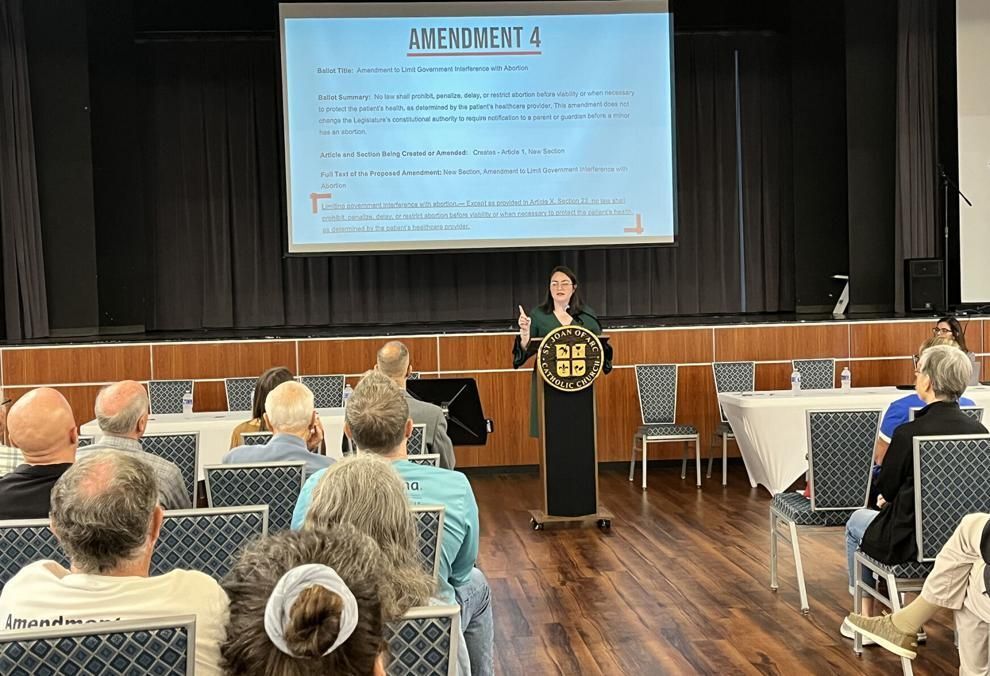
BOCA RATON | For months, pro-life speakers have been sounding the alarm about the proposal to expand abortion access in Florida through a constitutional amendment.
If approved by at least 60 percent of the state’s voters Nov. 5, Amendment 4 would make abortions available for any reason, at any time during pregnancy, even for minors without their parental consent.
Sara Johnson, statewide grassroots director for the Vote No on 4 campaign, is one of those speakers spreading the word. During her Sept. 25 appearance at St. Joan of Arc Parish in Boca Raton, she again warned attendees about the extreme, deceptive nature of the amendment and what it would mean for Florida.
Amendment 4 was initiated and written by a group called Floridians Protecting Freedom, which sponsored a petition drive to put the amendment on the ballot, Johnson said. The effort was funded by the American Civil Liberties Union, national Planned Parenthood, the George Soros-funded Open Society Foundation and other groups, she added.
Deceptions are hidden throughout the amendment, Johnson said. Even though the ballot question is called an “Amendment to Limit Government Interference with Abortion,” it aims to do much more than limit government action. “It’s an actual ban on what the Legislature can and can’t do,” she said.
The Amendment 4 ballot summary says, “No law shall prohibit, penalize, delay, or restrict abortion before viability or when necessary to protect the patient’s health, as determined by the patient’s healthcare provider. This amendment does not change the Legislature’s constitutional authority to require notification to a parent or guardian before a minor has an abortion.”
Johnson said, “That means no law from the Legislature, no regulation from the governor, no regulation from the Agency on Healthcare Administration. Nothing from our existing government can prohibit, penalize, delay or restrict abortion before viability. In those first words, the one that always catches in our eye is the word ‘delay.’ It means no law can even slow down your access to abortion.”
Especially concerning about the amendment’s wording is its lack of definitions for terms like “viability,” “patient’s health” and “healthcare provider,” she said. Without those defined terms, it’s possible that non-medical personnel at abortion centers could end up approving late-term abortions for women experiencing emotional stress or normal pregnancy-related issues.
Another deception is contained in the ballot summary’s second sentence, Johnson said. While it supports parental “notification” if a minor child receives an abortion, it actually throws out Florida’s current law requiring parental “consent” before that minor can have their baby aborted. Amendment 4 “would remove the requirement for parental consent prior to the minor’s abortion,” she said, “and that would actually make abortion the only procedure that a minor can undergo without a parent’s permission in the state of Florida.”
If approved, Amendment 4 could endanger another Florida statute that protects taxpayers from having to pay for elective abortions. As Johnson pointed out, the ACLU, which helped pass a similar amendment in Michigan two years ago, recently sued that state claiming its longtime ban on taxpayer-funded abortions for low-income residents presents an unfair and unlawful delay to medical care.
“When the ACLU helped to draft the Florida amendment, they were particular to write the words ‘No law shall delay,’” Johnson said. “And we believe that they would pick up the same threat of litigation here in Florida, saying that not having taxpayer funding of elective abortions would delay your access to care and would remove Florida’s existing law that protects our taxpayer dollars from going toward elective abortions. So, you have to worry about what it says and what it doesn’t say.”
The informational meeting began with Deanna Herbst-Hoosac, Respect Life ministry director with Catholic Charities, showing a new online video featuring Dr. Grazie Christie, a Miami radiologist, talking about Amendment 4. The video includes a short introduction by Bishop Gerald M. Barbarito.
Other speakers at the Boca Raton session included Katherine Bowers, program director of Catholic Charities’ Birthline/Lifeline pregnancy care centers; Chelsea Simmons, program director of the Women’s Pregnancy Solutions mobile units; Dr. Anthony Dardano, retired obstetrician/gynecologist; Father Timothy Cusick, a priest of the Diocese of St. Augustine who is academic dean/professor at St. Vincent de Paul Regional Seminary in Boynton Beach; and seminarian Jedidiah Preble.
To learn more about the Florida constitutional amendment being voted on in November and the video mentioned above, visit www.diocesepb.org/abortion-amendment.html, https://flaccb.org/abortion-amendment or https://votenoon4florida.com/. Connect with Vote No on 4 on Facebook, Instagram and X.

